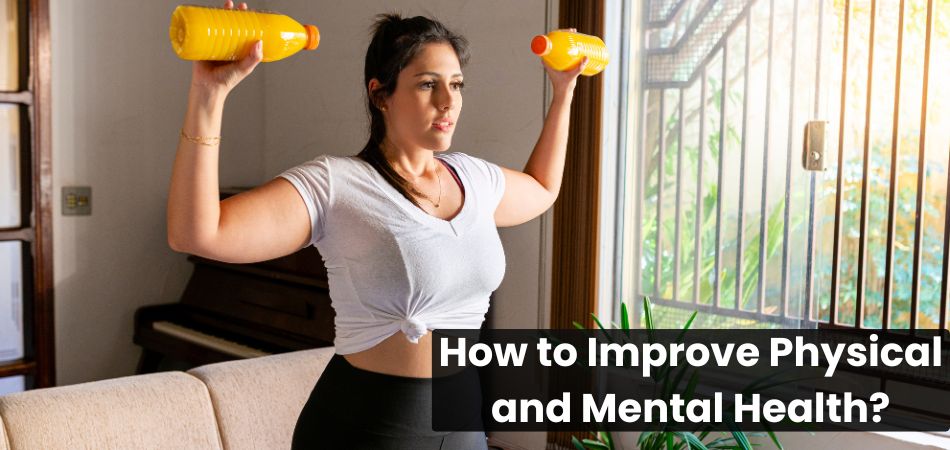Physical activity is more than just a tool for physical fitness—it’s a powerful ally for mental well-being. From reducing stress to boosting mood, exercise has a significant role in improving emotional resilience and mental clarity.
Experts continue to explore the fascinating ways movement impacts our minds, sparking curiosity about its deeper benefits. So, how does physical activity improve mental health?
Physical activity improves mental health by reducing stress, boosting mood through endorphin release, improving focus and resilience, and promoting better sleep, making it a natural and effective way to support emotional well-being.
Ready to maximize these transformative benefits? Take a look at the full article to explore expert perspectives and actionable tips to start improving your mental health today.
How Does Physical Activity Improve Mental Health?
Physical activity is a fundamental component of mental well-being, offering benefits far beyond physical fitness. It reduces stress, betters mood, and promotes a sense of overall happiness. Experts agree that incorporating exercise into your routine can significantly improve mental clarity and emotional resilience.

But how can physical activity improve mental health in specific ways? From boosting endorphins to building social connections, exercise positively impacts the brain and body alike. Below, we explore seven key areas where physical activity makes a difference, with practical insights to help you maximize its benefits.
Boosts Mood with Endorphin Release
Exercise triggers the release of endorphins, often referred to as “feel-good” hormones. These chemicals help combat stress and create a sense of euphoria. Activities like running or dancing can instantly change your mood, making it easier to face daily challenges. Over time, consistent physical activity builds a more positive mental outlook.
Reduces Stress and Anxiety
Physical activity lowers cortisol levels, the hormone responsible for stress. Engaging in activities like yoga or cycling provides a mental escape and induces relaxation. This helps in managing anxiety by calming the mind and body. Regular exercise strengthens your ability to cope with life’s pressures.
Enhances Brain Function and Memory
Exercise improves blood flow to the brain, enhancing cognitive function and memory retention. Aerobic activities like walking or swimming stimulate the growth of new brain cells. This leads to sharper thinking and better decision-making abilities. Regular workouts can even delay age-related cognitive decline.
Promotes Better Sleep
Physical activity helps regulate your sleep-wake cycle, promoting deeper and more restful sleep. It reduces insomnia by alleviating stress and tiring the body naturally. Better sleep supports mental clarity and emotional balance. Even moderate exercise, like a brisk walk, can improve your sleep quality significantly.
Builds Confidence and Self-Esteem
Achieving fitness goals through exercise boosts your sense of accomplishment and self-worth. Regular activity improves your physical appearance, which can enhance confidence. Feeling stronger and more capable translates into greater emotional resilience. This newfound self-assurance positively impacts all areas of life.
Supports Social Connections
Group exercises, sports, or gym sessions give people opportunities to build social connections. Being part of a community reduces feelings of loneliness and isolation. Positive interactions with others enhance mental well-being and emotional support. This social aspect of exercise can make workouts more enjoyable and motivating.
Acts as a Natural Antidepressant
Exercise stimulates neurotransmitters like serotonin and dopamine, which help fight depression. These chemicals are crucial in maintaining emotional stability and reducing negative thoughts. Activities like jogging, dancing, or even gardening can serve as natural mood boosters. Consistent physical activity offers long-term relief from depressive symptoms.
Relationship Between Physical Activity and Mental Health
Physical activity and mental health share a deeply interconnected relationship, with exercise playing a crucial role in maintaining emotional and psychological well-being. Regular physical activity stimulates the release of endorphins, often called “feel-good” hormones, which help reduce stress, anxiety, and depression. This natural mood boost is one of the most immediate and noticeable benefits of exercise.
Beyond mood enhancement, physical activity improves brain function by increasing blood flow and stimulating the production of new brain cells. Activities like running, swimming, or yoga can enhance memory, focus, and overall cognitive function. Furthermore, exercise promotes better sleep, which is essential for maintaining emotional balance and mental clarity.
Social connections developed through group activities or sports also contribute to improved mental health by reducing feelings of isolation. Whether it’s a brisk walk, a gym session, or a dance class, physical activity supports resilience and self-confidence. Together, these benefits highlight how exercise is a cornerstone of holistic mental well-being.
Types of Physical Activity Are Best for Mental Health
Physical activity can take many forms, each offering unique benefits for mental well-being. The best type often depends on your personal preferences and lifestyle. Below, we explore some types of physical activity that are particularly effective for improving mental health, highlighting their specific advantages.

Aerobic Exercise for Mood Enhancement
Aerobic exercises like running, cycling, and swimming are known to release endorphins, providing an instant mood boost. These activities improve heart health while reducing symptoms of depression and anxiety. The rhythmic nature of aerobic exercise can be meditative, helping to calm the mind. Even 30 minutes a day can lead to noticeable mental health improvements.
Strength Training for Confidence
Strength training, including weightlifting and resistance exercises, promotes a sense of accomplishment and self-esteem. Building physical strength often translates into greater mental resilience. It also helps regulate mood by reducing stress-related hormones like cortisol. Strength training offers both mental and physical empowerment.
Yoga for Stress Reduction
Yoga combines physical movement with mindful breathing, making it highly effective for reducing stress and anxiety. By calming the nervous system, it enhances emotional regulation and mental clarity. Basically, yoga transforms your body by improving flexibility, balance, and self-awareness. Its meditative qualities make it a holistic exercise for both body and mind.
Walking for Accessibility and Relaxation
Walking is a simple yet powerful activity for improving mental health. It’s accessible to all fitness levels and allows for connection with nature, further enhancing its calming effects. Brisk walks can speed up your heart rate, releasing endorphins, while slower-paced walks encourage mindfulness. Daily walks provide a mental recharge and emotional balance.
Team Sports for Social Connection
Team sports like soccer, basketball, or volleyball combine physical activity with social interaction. Playing as part of a team reinforces camaraderie, reduces loneliness, and builds interpersonal skills. The shared goals and mutual support in team sports enhance mental well-being. It’s an engaging way to stay active while strengthening community ties.
Dance for Joy and Creativity
Dance blends physical activity with creative expression, making it a fun and uplifting exercise. The rhythm and movement release tension and improve mood while encouraging coordination. Dance classes or even solo dancing at home can reduce stress and boost self-confidence. It’s a joyful way to connect with your emotions and release energy.
How to Improve Physical and Mental Health?
Achieving optimal physical and mental health requires a holistic approach that nurtures both body and mind. Simple lifestyle adjustments can significantly improve overall well-being and resilience. Below, we explore some actionable strategies to help you better your physical and mental health.

1. Incorporate Regular Exercise into Your Routine
Physical activity is essential for maintaining both physical fitness and mental clarity. Exercise boosts cardiovascular health while releasing endorphins, which positively affect mood and reduce stress. Activities like walking, yoga, or strength training can fit seamlessly into your daily schedule. Consistency is key—aim for at least 30 minutes of exercise most days of the week.
2. Adopt a Balanced and Nutritious Diet
A healthy diet fuels both the body and the brain, providing the nutrients needed for optimal function. Include whole grains, lean proteins, fruits, and vegetables in your meals. Reducing sugar and processed foods can help stabilize energy levels and improve mood. Staying hydrated is equally important for mental clarity and physical stamina.
3. Prioritize Quality Sleep
Good sleep is the foundation of both physical recovery and mental well-being. Aim for 7–9 hours of quality sleep each night to allow your body and mind to recharge. Establish a consistent sleep schedule and create a calming bedtime routine to improve sleep quality. Avoid caffeine and screen time before bed to ensure deeper rest.
4. Practice Mindfulness and Stress Management
Mindfulness practices like meditation and deep breathing exercises help reduce stress and enhance emotional resilience. These techniques calm the nervous system, promoting a sense of balance and focus. Even a few minutes a day can improve mental health and lower anxiety levels. Pair mindfulness with activities like journaling or gratitude exercises for added benefits.
5. Build and Maintain Social Connections
Strong social ties play a crucial role in mental and emotional health. Spending time with loved ones or participating in community activities can reduce feelings of loneliness and boost happiness. Building meaningful relationships provides emotional support and a sense of belonging. Surround yourself with positive influences to enable both physical and mental growth.
What Are the Mental Health Benefits of Regular Exercise?
Regular exercise goes beyond physical fitness; it nurtures emotional and psychological well-being in unique ways. Engaging in consistent physical activity can build resilience, emotional stability, and even creativity. Below are some lesser-discussed mental health benefits of regular exercise.
- Increases Emotional Regulation: Exercise helps balance emotional responses by reducing overactivity in stress-related brain areas. This makes it easier to manage anger, frustration, and sadness in everyday life.
- Encourages a Growth Mindset: Achieving fitness milestones reinforces a belief in self-improvement. This mindset can spill over into other areas of life, boosting overall confidence and motivation.
- Promotes Mindful Movement: Certain activities like tai chi or Pilates encourage focus on the present moment. This helps reduce racing thoughts and cultivates mindfulness in daily routines.
- Reduces Feelings of Fatigue: Exercise combats mental exhaustion by increasing energy levels and alertness. This revitalization improves productivity and focus throughout the day.
- Boosts Adaptability to Change: Consistent physical activity enhances mental flexibility, helping individuals cope with new challenges. This resilience is crucial for navigating life’s uncertainties.
- Supports Hormonal Balance: Exercise regulates hormones like serotonin and oxytocin, which are essential for mood stabilization. Balanced hormones contribute to a calmer and more positive state of mind.
How Much Exercise Is Needed to See Mental Health Benefits?
Research suggests that even modest amounts of exercise can yield significant mental health benefits. Engaging in as little as 30 minutes of moderate activity, such as brisk walking, five days a week can boost mood, reduce anxiety, and improve overall mental well-being. For those pressed for time, breaking this into shorter sessions, like three 10-minute walks, can still provide noticeable improvements.
For more pronounced benefits, such as combating depression or enhancing cognitive function, incorporating a mix of moderate and vigorous activities is ideal. Examples include cycling, running, or strength training, performed for 75–150 minutes weekly. Importantly, consistency matters more than intensity—regularity builds resilience and long-term mental health gains.
Individual needs and preferences vary, so it’s essential to find activities you enjoy and can sustain. Starting small and gradually increasing duration or intensity ensures success without feeling overwhelmed. Whether it’s yoga, dancing, or team sports, the right amount of exercise is the one that keeps you motivated and engaged.
FAQs About the Mental Health Benefits of Exercise
While exercise is widely known for its physical advantages, its mental health benefits often raise many questions. From how it influences emotions to its role in long-term mental well-being, these FAQs address some key concerns. Here are some common questions about how exercise supports mental health, with concise, practical answers.
1. Can Exercise Prevent Mental Health Issues?
Exercise cannot completely prevent mental health issues but can significantly reduce their likelihood and severity. It helps build emotional resilience and provides tools to cope with stress. Regular physical activity ensures a balanced lifestyle, which is crucial for long-term mental health stability.
2. Is It Possible to Overdo Exercise for Mental Health?
Yes, excessive exercise can lead to burnout and negatively affect mental health. Overtraining can increase fatigue, irritability, and stress instead of alleviating them. It’s essential to maintain a balanced routine with adequate rest and recovery.
3. How Quickly Can Exercise Improve Mental Health?
Some mental health benefits, such as improved mood and reduced stress, can be felt immediately after exercise. However, long-term benefits like reduced symptoms of depression or anxiety may take weeks of consistent activity. Patience and regular effort are key to seeing sustained improvements.
4. Does the Type of Exercise Matter for Mental Health?
While all exercise offers mental health benefits, the best type is one you enjoy and can sustain. Activities like yoga, running, or team sports provide different advantages depending on your preferences and needs. The key is to find what makes you feel good and stick with it consistently.
5. How Does Exercise Benefit Mental Health as We Age?
Exercise supports mental health by improving memory, focus, and emotional well-being as we age. It can help delay cognitive decline and reduce the risk of conditions like Alzheimer’s disease. Staying active also promotes social engagement, which is vital for emotional health in later years.
Final Words
Knowing how does physical activity improve mental health underscores the powerful connection between movement and emotional well-being. Regular exercise not only enhances mood but also builds resilience, reduces stress, and promotes overall mental clarity.
Whether it’s a brisk walk, a dance class, or yoga, finding activities you enjoy can make all the difference. The benefits are accessible to everyone, regardless of fitness level or age.
By incorporating even small amounts of physical activity into your routine, you take a proactive step toward a healthier, happier mind. Start today and experience the transformative effects of movement on your mental health.
